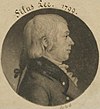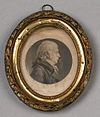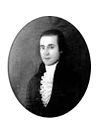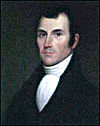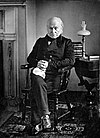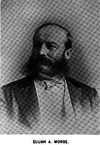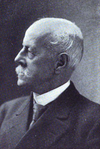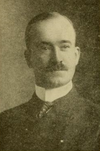Massachusetts's 12th congressional district
| Massachusetts's 12th congressional district | |
|---|---|
| Obsolete district | |
| Created | 1795 1880 |
| Eliminated | 1840 1980 |
| Years active | 1795–1843 1883–1983 |

Massachusetts's 12th congressional district is an obsolete district that was first active 1795–1803 in the District of Maine and 1803–1843 in Eastern Massachusetts. It was later active 1883–1893 in Western Massachusetts and 1893–1983 in Eastern Massachusetts. It was most recently eliminated as a result of the redistricting cycle after the 1980 census. Its last congressman was Gerry Studds, who was redistricted into the 10th district.
Notable persons elected to the U.S. House of Representatives from the 12th congressional district include John Quincy Adams, following his term as president, and James Michael Curley, four-time Mayor of Boston.
Cities and towns in the district
[edit]1790s–1830s
[edit]This section needs expansion. You can help by adding to it. (November 2013) |
1880s–1900s
[edit]This section needs expansion. You can help by adding to it. (November 2013) |
1910s
[edit]Suffolk County: Boston Wards 13, 14, 15, 16, 17, 20, 24.[1]
1920s
[edit]Boston (Wards 9, 10, 11, 12, 17, 18, 19, 20, 21).[2]
1940s
[edit]Boston (Wards 6, 7, 8, 9, 11, 13, 14, 15, 16, 17).[3]
1950s–1980s
[edit]This section needs expansion. You can help by adding to it. (November 2013) |
List of members representing the district
[edit]Notes
[edit]- ^ "Massachusetts". Official Congressional Directory: 64th Congress (2nd ed.). Washington DC: Government Printing Office. 1916. hdl:2027/uc1.l0075858456.
- ^ Commonwealth of Massachusetts (1921), "Population of Congressional Districts", Population of Massachusetts as determined by the fourteenth census of the United States 1920, Boston: Wright & Potter, hdl:2027/nnc1.cu56182970
- ^ Commonwealth of Massachusetts (1941), "Population of Congressional Districts", Population of Massachusetts as determined by the sixteenth census of the United States, 1940, Boston: Wright & Potter, OCLC 10056477,
House No. 2849
- ^ "Seventh Congress March 4, 1801 to March 3, 1803". Office of the Historian, United States House of Representatives. Retrieved January 11, 2019 – via History.house.gov.
- ^ "Eighth Congress March 4, 1803 to March 3, 1805". Office of the Historian, United States House of Representatives. Retrieved January 11, 2019 – via History.house.gov.
- ^ "Tenth Congress March 4, 1807 to March 3, 1809". Office of the Historian, United States House of Representatives. Retrieved January 11, 2019 – via History.house.gov.
- ^ "Thirteenth Congress March 4, 1813 to March 3, 1815". Office of the Historian, United States House of Representatives. Retrieved January 11, 2019 – via History.house.gov.
- ^ L.A. Coolidge (1897). "Massachusetts". Official Congressional Directory: Fifty-Fifth Congress. Washington DC: Government Printing Office.
- ^ A.J. Halford (1903). "Massachusetts". Official Congressional Directory: Fifty-Eighth Congress. Washington DC: Government Printing Office.
- ^ A.J. Halford (1909). "Massachusetts". Congressional Directory: 60th Congress (2nd ed.). Washington DC: Government Printing Office.
References
[edit]- Martis, Kenneth C. (1989). The Historical Atlas of Political Parties in the United States Congress. New York: Macmillan Publishing Company.
- Martis, Kenneth C. (1982). The Historical Atlas of United States Congressional Districts. New York: Macmillan Publishing Company.
- Congressional Biographical Directory of the United States 1774–present
- "Our Campaigns - United States - Massachusetts - MA - District 12". www.ourcampaigns.com. Retrieved December 31, 2020.




